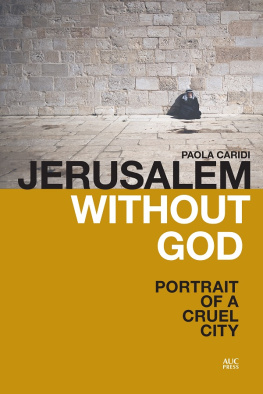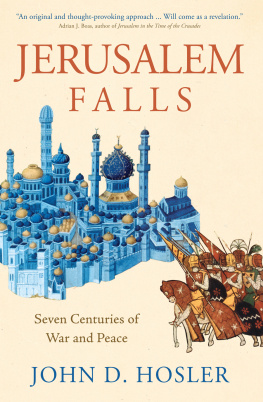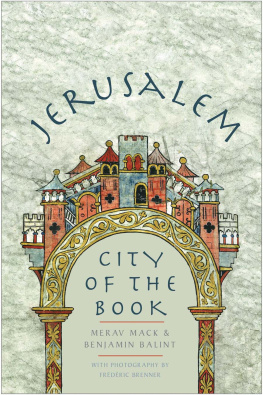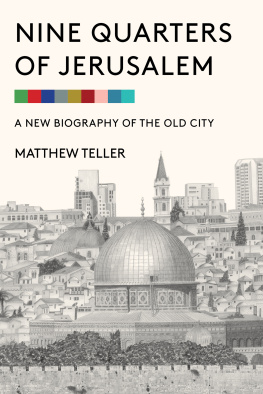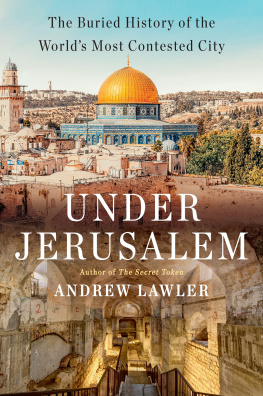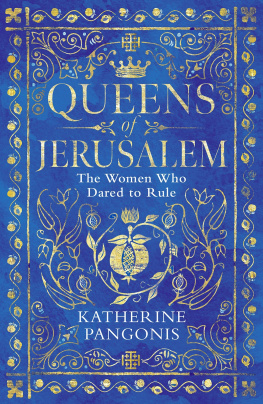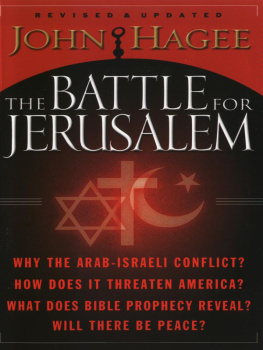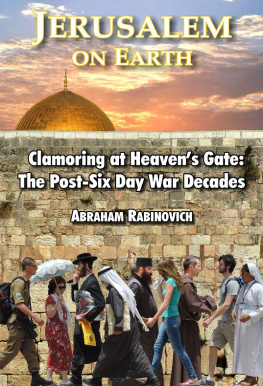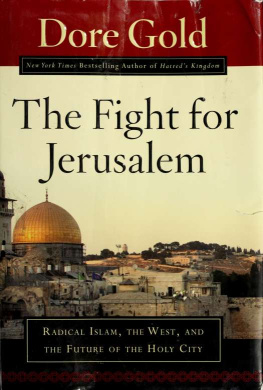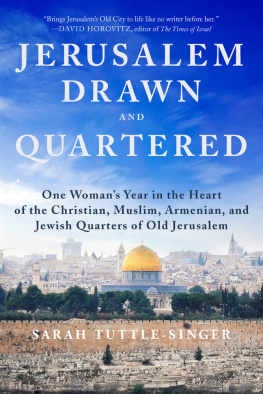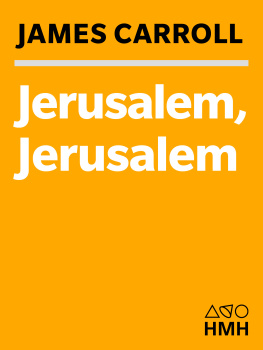JERUSALEM
WITHOUT
GOD
This electronic edition published in 2017 by
The American University in Cairo Press
113 Sharia Kasr el Aini, Cairo, Egypt
420 Fifth Avenue, New York, NY 10018
www.aucpress.com
Copyright Giangiacomo Feltrinelli Editore, 2013
First published as Gerusalemme senza Dio in September 2013 by Giangiacomo Feltrinelli Editore, Milan, Italy
Published by arrangement with Giangiacomo Feltrinelli Editore
English translation by Yvonne Freccero, copyright 2017 by Paola Caridi
All rights reserved. No part of this publication may be reproduced, stored in a retrieval system, or transmitted in any form or by any means, electronic, mechanical, photocopying, recording, or otherwise, without the prior written permission of the publisher.
An earlier version of Chapter 1, Musrara, the Center of the World, was first published in Jerusalem Quarterly 62 (2015): 2942. Reproduced by permission.
ISBN 978 977 416 818 5
eISBN 978 1 61797 799 2
Version 1
To my son, Francesco Matteo Landi, who became a citizen of the world through his Jerusalem endeavor over the last decade.
CONTENTS
T his is a book full of ghosts. They are the victims, they are men and women who died in a daily, widespread, often hidden, sometimes eye-catching, never-ending conflict. Almost none of the victims had a resounding, familiar, famous name.
This a book full of the ghosts of friends who passed away. Before their deaths, they were our Virgils: they accompanied me, my husbandTV war reporter Filippo Landiand my family in our dozen-years-long personal and professional experience in Jerusalem. Our thoughts and our gaze on the city would have been different had they not helped us: Father Michele Piccirillo, Bishop Pietro Sambi, Nicola Manduzio, Franco Scaglia, and, far from the Middle East, our beloved friend Toni Fontana.
This is a book where sacred and mundane stones are only the backdrop and sometimes the stage of the ongoing story. There, on stage, unfolds a very human history, played by the people, the invisible protagonists of my days in Jerusalem. I wish to thank them wholeheartedly, with a lot of nostalgia for having shared a whole chapter of my life with them. I will mention only some names, and I will leave some important men and women in the shade where they wish to remain hidden. For instance Michel, my Virgil through the neighborhood of Musrara, is the pseudonym of an old and gentle man, whose friendship I consider one of the most precious gifts Jerusalem gave to me.
Let me name the names, though. First of all, Raf Scelsi, Feltrinelli publishing house editor, who succeeded once again in convincing me to go beyond my reluctance and tackle an issue as complex as writing a book on Jerusalem. Eric Salerno, Sahira Dirbas, Michele Giorgio, Nabil Salameh. And Michele Lobaccaro, who surprisingly and smoothly helped me to understand that a secular person like myself could also speak about Jerusalem. Ambrogio Manenti, Tanja Popovic, Letizia Carracci, Carla Benelli, Osama Hamdan, Francesca Nardi, Francesco Battistini, Paola Pollo, Meron Rapoport, Susan Bino, granpa Avraham, Noha Brosh. Mahdi Abdul Hadi, Joharah Baker, Nasra Dahdal, Suleiman Rabadi, and all the College des Frres teachers, hajj Ali, Abu Majdi, abuna Ibrahim Faltas, the Muna family. Last but not least, our very special Jerusalemite family, the nuns community of the Salesian Sisters in the heart of Musrara: Milena, Giuliana, Sabina, Caterina, Margherita, and the late Regina. My small and pugnacious Pickwick Club inspired, encouraged, and spurred me on, sharing the same passion for a very special city that wounds hearts and often mangles the faith of the faithful.
The English edition of my book would not have been possible without the passionate help of Lucia Sorbera and the professional vision of Nadia Naqib. I wish to thank Yvonne Freccero for the translation. And, last but not least, Kevin Dean for his patience and kindness.
My son Francesco Matteo Landi, to whom I dedicate this book, told me when he was thirteen, You know better than me of Jerusalems history, but I experienced the city by myself more than you did. He was right then. He is right today. I just hope that his very intense and in some ways defying Jerusalem experience will teach him to respect, always and everywhere, the dignity of each person he will meet.
I thought and thought about what I would regret on the day I abandoned Jerusalem. Yes, Jerusalem: a sought-after city, mythicized, mourned, and yet so foreign to me that I would never, ever have thought it would become my home, my place of work, the setting for an entire decade of my life. A decade that proved the most demanding of my life, the longest I spent continuously in a single citya closed city, walled and unreal like the Bastiani Fortress, which Dino Buzzati described so wistfully in his The Tartar Steppe. And I would take the role of Giovanni, Lieutenant Giovanni Drogo, who watches the years go by standing guard and waiting for something that has not yet happened in the long story of his tenure.
I thought about the city endlessly, even after shutting up my house opposite the powerful walls of Suleiman the Magnificent on a day in September, hot as September always is in Jerusalem. I felt nothing, no nostalgia; it was as though a door were closing behind someone after a long affair, yet I felt no regret. No nostalgia, even at that moment. It did not come until months later, on the steps of the bishopric of Mazara del Vallo, where I heard a familiar sound that had become intimate, in its own way, in my life. It was cold, wintry cold, and the rain carried the distant smell and sound of the sea, opening itself to the west, roaring as in a perfect storm. And this sound, clear and alien, had the power to cut through like a saber and cure my bitterness toward a city that, over time, I had found to be cruel. Allahu akbar , God is great, sang the muezzin, just beyond the white walls of the bishopric. The Muslim call to prayer that penetrated even a clearly Christian place, in western Sicily (so soaked in its own ancient Arab history), roused in me the sweet taste of nostalgiathe soothing sense of nostalgia.
Suddenly I discovered with a resonant flash that I did not regret the streets of Jerusalem, the sacred stones, the dazzling white of its historical architecture and the artificiality of its present architecture. But I missed the rhythms of the day. A clocks hours would seem to be the same everywhere in the world, were it not that Jerusalem so very clearly and precisely reveals its fate as a city in perpetual conflict. In so-called normal, conforming cities, time and space speak to each other, intersect with each other, and are almost never in obvious contradiction. It is not like this in a city that continues to be divided, despite what is said by at least one of the parties in the conflict, Israel, which claims the unity of a Jerusalem liberated ever since 1967that claims Jerusalem to be the countrys one and indivisible capital. The reality is something else. Many architectural barriers that pilgrims have glimpsed on their swift journeys through the Holy Land signal the plight of the city and its inhabitants. More than its fragmented space, however, Jerusalems sounds communicate the reality of Jerusalem. And if one withdraws from its difficult daily routine and stops to listen, it is possible to ascertain the plight of the city through its symphony of sounds.
In Jerusalem there are still times of the day that correspond to sounds and rhythms, that make for real moments to pause in the light but incessant beat of existence. Those sounds and rhythms are as ancient as the city: they are indeed a true and clear representation of it. Such as at the end of the days cycle, the city is all set to lose the whiteness that is diffused in every corner, monotonous, almost like a hospital. When the sun is about to set, the sky is streaked with a delicate and luminous pink. It is no different from a Southern sunset, a Sicilian sunset, except that the event is announced by a song that rises in unison, and jolts usus the inhabitants, the Jerusalemitesinto paying attention to something beyond ourselves. Nothing escapes the distraction it asserts on our doings, our intimate rhythms. It is sunset, and everyone must know it, because in a few minutes everything will disappear into darkness.

